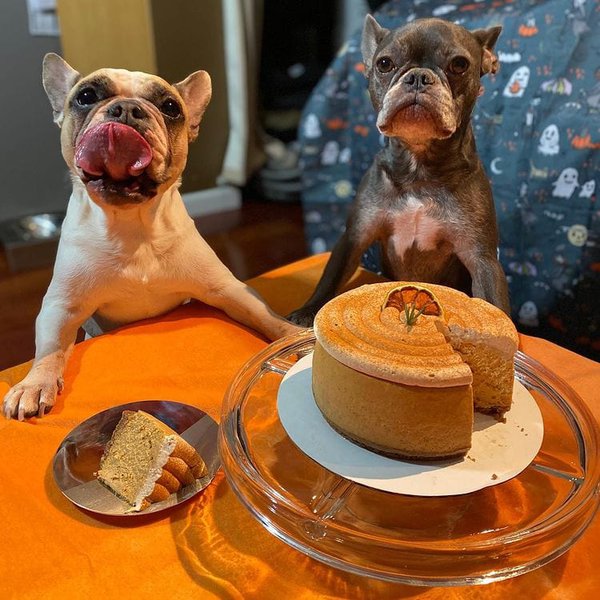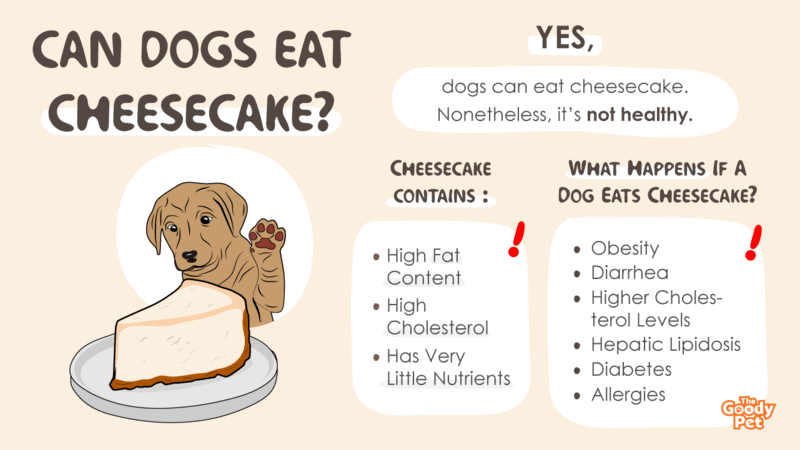Our dogs are particularly fond of picking up certain traits from their owners or us, and feeding habits aren’t excluded. So, if you love cheese, as I do, you may wonder whether your dog can enjoy its yummy taste without negative effects.
Well, dogs can eat cheesecake. Nonetheless, it’s not healthy for them as it contains a high amount of fat with very little nutrients. So, feeding your pooch cheesecake for an extended period will cause it to become obese and have diabetes if you replace its feed with it.
You may want an in-depth answer to why it’s a terrible idea to give your dog cheesecake. Thus, please keep reading as I’ll be talking about it here.
What Happens If A Dog Eats Cheesecake?

When your dog has a little piece of cheesecake once in a while, nothing will happen to it. However, if you give your dog cheesecake to the extent that it replaces its normal food, health concerns such as obesity, diarrhea, and other diseases will arise.
Please join me as I talk about these below.
Obesity
It’s common knowledge that cheesecake is based on cheese, which has a lot of fat. For every 3.5 oz piece of cheesecake, there is about 0.8 oz of fat which is quite high.
Furthermore, dogs are naturally predisposed to weight gain because of their metabolism. This predisposition is why you need to carefully consider the kinds of food your dog eats.
Obesity is particularly dangerous for dogs because it eventually leads to sluggishness and cardiovascular diseases. When your puppy becomes sluggish, it will not carry out its daily activities with ease. Thus, its metabolic rate will decrease such that it won’t even be able to pump blood to the heart at the normal rate.
Sadly this particular issue is directly associated with other cardiovascular diseases.
Higher Cholesterol Levels
Cheesecake is not only loaded with fat but also cholesterol. Cholesterol comes from saturated fats present in high amounts in cheesecake. Studies show that for every 3.5 oz of cheesecake, there’s about 55 mg of cholesterol.
This amount may seem small, but it’s quite dangerous, especially when your dog has formed a habit of taking huge munches of cheesecake regularly. Cholesterol doesn’t digest to be used up by the body. After your dog eats it, it will get absorbed into the bloodstream and settle on blood vessels.
Subsequent consumption of cheesecake containing high cholesterol levels may lead to a significant obstruction of the blood vessels. This would lead to an increase in blood pressure in the process and cause cardiovascular issues.
Hepatic Lipidosis
Another issue of great concern in dogs is lipidosis. Lipidosis occurs mostly in omnivores like dogs and humans. It is a disease caused by the accumulation of fatty acids in the liver of a canine.
Lipidosis is caused by the consumption of high-fat foods in dogs. Cheesecake is not an exception to this. The function of the liver is to purify the blood that circulates the body of your dog. So when the blood contains a high amount of lipids, the liver will have to get them out of there.
Unfortunately, the liver ends up absorbing these fats, and over time, this leads to lipidosis. When your puppy reaches this stage, its liver will be unable to perform well, and without immediate intensive care, it could die.
Diabetes
The unlikely entry in our list of effects is diabetes. Diabetes is a problem most dogs that eat untraditional feed tend to suffer from. You may wonder how fat in cheesecake causes diabetes in dogs. Well, I’ll get to that as soon as I explain how the carbs do.
Cheesecake is made from ingredients that contain an uncanny amount of fats. For instance, a typical cheesecake base is made of crushed cookies and crackers. The cake itself has a high amount of sugar in it — 0.8 oz for every 3.5 ounces.
Furthermore, fat itself is converted to glucose, a sugar, via gluconeogenesis. So, even if the cheesecake doesn’t have a base, there’s still a high chance of your dog getting an extreme dose of glucose.
It’s not exactly the high sugar dose that causes diabetes. The pancreas cannot produce enough insulin to check the glucose that causes it. Since fat circulates your puppy’s body when it eats a high-fat diet, it settles down on essential organs blood is pumped to.
A fatty pancreas is an ineffective one, and this is lethal to your dog.
Will My Dog Die If It Eats Cheesecake?
No, your dog will not die immediately upon eating cheesecake. Nonetheless, if cheesecake has become a major part of its diet, then there’s a high chance of your dog dying over time.
As aforementioned earlier, there are a couple of effects of cheesecake on your dog. These effects do not immediately kill, but over time, they become fatal.
For instance, diabetes is not exactly fatal at its onset. Nonetheless, after a long period of living with it, one sudden case of hyperglycemia or hypoglycemia could lead to your pooch having a painful death.
What about obesity? Obesity is particularly dangerous because it’s a slow killer. When combined with high cholesterol levels, this condition could lead to instant death in your dog.
For instance, when fats have clogged the blood vessels of your canine buddy to the extent that the blood pressure becomes too high, your dog could have a cardiac arrest.
If the heart of your pooch were healthy, it would have a little chance to fight this. However, as with other organs by that time, it would have been covered in fat and become less effective at doing its work.
Can My Dog Have Cream Cheese?
It would be best not to give your dog cream cheese. Cream cheese is the more liquid version of cheese. If you’ve had a bite of coagulated cheese before, tasting cream cheese could be pretty weird. It’s made of milk and is fat-dense.
Furthermore, prepared cream cheese often has added sugars. So, apart from the high-fat content posing an issue to your dog’s health, the glucose content also does.
Also, unlike coagulated cheese, cream cheese is not hard. This means it could cause diarrhea in your dog. Diarrhea is particularly dangerous in canines because it causes them to lose a lot of liquid. If your dog doesn’t have access to enough water and a vet doesn’t intervene, it could die.
Can My Dog Be Allergic To Cheesecake?

Your dog can be allergic to cheesecake. Most dog breeds are lactose-intolerant. As mentioned previously, cheesecake is based on milk. Milk itself contains lactose — a sugar found only in dairy products.
Lactose intolerance will not make your dog unattractive to dairy products like cheesecake. It will only cause it to suffer from its effects.
The effects of lactose intolerance in dogs are quite scary because they’re highly lethal. If your dog consumes cheesecake with a large amount of lactose, it could suffer from diarrhea, bloating, vomiting, rashes, skin irritation, weight loss, and, of course, abdominal pain.
If these effects don’t stop you from giving your dog cheesecake, perhaps knowing that in less than three days of suffering from these chronic symptoms, your dog could die will change your mind.
In addition, what causes lactose intolerance in dogs is mainly caused by their inability to produce lactase — the enzyme that digests lactose. Because of this, the only kind of cheesecake your dog can eat, if it must, is lactose-free cheesecake.
How Do I Know My Dog Is Allergic To Cheesecake?
You can know if your dog is allergic to cheesecake if:
- It displays symptoms of lactose intolerance and allergy to dairy products.
- The results of a lactose-intolerant test run on your pooch come out positive.
Some symptoms of lactose intolerance include the following:
Rashes
One of the most common indicators of an allergy to something is rashes. Rashes usually occur when your furry companion’s skin comes in contact with something it does not like.
It also happens when the chemical reactions in the body of your dog initiate a response to the substance — the cheesecake in this case — after ingesting it. When your dog starts developing rashes after eating cheesecake, it’s most likely allergic to it.
Skin Irritation
Your dog’s skin could suddenly start turning red when it eats cheesecake. Like rashes, skin irritation mostly happens when internal reactions initiate it.
Abdominal Pain
Abdominal pain is one of the symptoms that’s difficult to diagnose in dogs, especially when you’re not a vet. Your canine pal could just go to a corner and lie down when it has a tummy ache. If you notice that happening after it eats cheesecake, it could be allergic to it.
Nonetheless, dogs also do this when they’re full and need a nap. But if your dog stays awake and starts moving uncomfortably while lying down, it has a tummy ache.
Vomiting
Vomiting is also another symptom dogs display when their bodies don’t like what they ingest. If your dog has ever eaten grass and thrown up shortly after that, you may be familiar with this.
If your dog vomits after eating a piece of cheesecake, likely, its body cannot metabolize what it has eaten.
Diarrhea
Diarrhea is a more common effect of allergy. If your dog starts stooling uncontrollably after eating cheesecake, it’s most likely allergic to it. Diarrhea is very lethal in dogs and should be taken seriously.
Dehydration
Dehydration goes hand in hand with diarrhea. When your dog egests useful liquid in high amounts, it will become dehydrated. The sad part is if your dog doesn’t have access to water or you don’t give it oral rehydration therapy.
Your dog could die after prolonged periods of rapid dehydration. Also, death will eventually occur when your dog’s body doesn’t have enough water to function and carry out its activities.
Bloating
Bloating is another symptom of allergy. If your dog cannot digest cheesecake due to an allergy to it, its abdomen will become bloated.
The bloating is caused by the mass of undigested cheesecake your dog ate. Bloating is quite dangerous. It takes up the space other food ready for digestion could have. Over time, if you keep giving it cheesecake, it could die of gut obstruction.
Nonetheless, before it reaches this stage, it would have started vomiting most of its food.
Lactose Allergy Tests
You can take your dog for a lactose allergy test when you notice any of these symptoms. It’s best to take it for these tests even before it starts displaying these signs. And the best time for this is when you adopt your pup.
Many vet clinics offer this service. If you haven’t given your dog any dairy products, then a sample of its blood will be taken and tested for lactase.
However, if your dog displays the symptoms of lactose allergy, the veterinarian will perform a physical examination of your dog. So, these tests are the best because they are more accurate than just identifying these signs and making assumptions.
What To Do If My Dog Eats Cheesecake When It Is Allergic To It
The best thing to do if your dog eats cheesecake when it’s allergic to it is to take it to a vet clinic or dial the Animal Poison Control hotline.
Allergic reactions caused by cheesecake aren’t immediately lethal. Nonetheless, it’s best to provide medical care to your furry friend as soon as possible.
So, while waiting for the vet, here are some tips you can take that will be of help to your dog:
- Do not induce vomiting on your pooch when it eats cheesecake.
- Keep cheesecake and dairy products far away from your canine buddy.
- If your dog is suffering from diarrhea, especially prolonged ones, provide enough water for it to drink and hydrate.
- Give your dog homemade oral rehydration therapy when it has diarrhea. You can do this by making a solution of eight teaspoons of sugar and one teaspoon of salt in one quart of clean water and giving it to your dog.
Is Plain Cheesecake Okay For Dogs To Eat?
Plain cheesecake is not okay for your dog to eat. These cheesecakes still contain a high amount of fats. Even though sugar isn’t added, they can still have some little amounts of glucose.
Furthermore, if your dog is lactose intolerant, giving it, plain cheesecakes is still a bad idea. Why? Cheesecakes, whether plain or not, still contain lactose. And as aforementioned, it can cause a lot of issues for your dog.
Is Plain Cheesecake Toxic To Dogs?
Well, plain cheesecake is not toxic to your dog if it is lactose tolerant. Nonetheless, if it isn’t, then cheesecake would be toxic to your dog.
Toxic substances usually have negative effects on dogs that consume them. And lactose-intolerant dogs present symptoms of allergy or poisoning as soon as they ingest cheesecakes.
So, it’s pretty safe and admonishing to say that plain cheesecakes are toxic to many dogs.

Can My Dog Have Other Kinds Of Cheesecakes?
Unfortunately, most other kinds of cheesecakes aren’t healthy for dogs.
The reason why they aren’t is that they contain lactose and a high amount of fats. Furthermore, cheesecake variations often contain added sugars or different flavors containing saccharin or xylitol, both of which are dangerous to dogs.
So, the only kind of cheesecake suitable for your dog is lactose-free, cholesterol-free cheesecake with very low amounts of unsaturated fats.
Can My Dog Have Strawberry Cheesecake?
Your dog should not eat strawberry cheesecake. Strawberry cheesecake is still cheesecake but with strawberry flavor and most likely more sugar and a strawberry topping.
What’s worse is that the sugar used may not be glucose itself. Xylitol may have been used to produce it.
Xylitol is particularly dangerous to dogs because it releases glucose in high quantities in your dog very quickly. This boosts your dog’s blood sugar levels, and for dogs with diabetes, this is very dangerous.
Also, some dogs tend to be allergic to xylitol. So, it’s best not to give your dog strawberry cheesecake.
Can My Dog Have Chocolate Cheesecake?
Your dog should not have chocolate cheesecake as chocolate cheesecake contains chocolate flavoring or chocolate itself.
Sadly, a substance called theobromine is present in chocolate, and it’s toxic to dogs.
If your dog consumes chocolate cheesecake, it could suffer from chocolate poisoning. And symptoms of this condition include lethargy, vomiting, diarrhea, and other painful effects.
Also, like other cheesecakes, chocolate cheesecakes have high amounts of fats and sugars in them. These nutrients in excess are dangerous to your canine pal.

Can My Dog Have Pumpkin Cheesecake?
Your dog can have pumpkin cheesecake but in very low quantities. While pumpkin has a lot of useful nutrients for dogs when in cheesecake, it’s not good for your dog.
Pumpkin cheesecake is typically a regular cheesecake with pumpkin toppings or blended pumpkin filling. So, there’s still high amounts of fat and sugar in pumpkin cheesecake most times.
Can My Dog Have Plain Cheese?
If your dog is lactose-intolerant, it can have small amounts of plain cheese. Nonetheless, I recommend not giving your dog any plain cheese at all. Even though it is plain, cheese still has a high amount of fats, and as aforementioned, this is dangerous for dogs.
Furthermore, through fermentation, plain cheese can have an incredible amount of glucose. So, while it’s better than cheesecake for your dog, it still isn’t healthy food.
It is recommended to give your dog healthy food rather than testing out cheesecakes, even as a treat. That way, your dog won’t get addicted to the taste and long for more.





